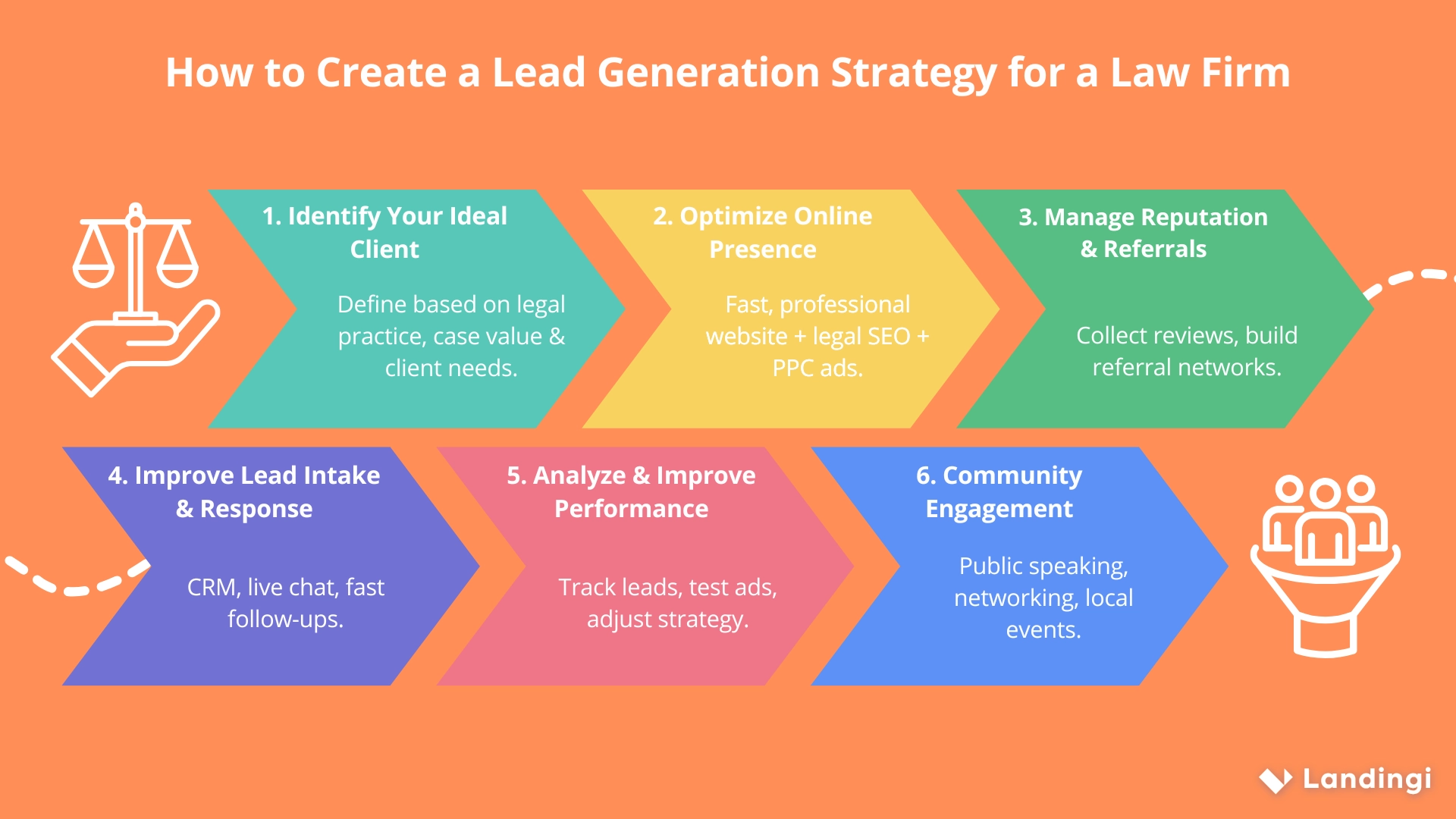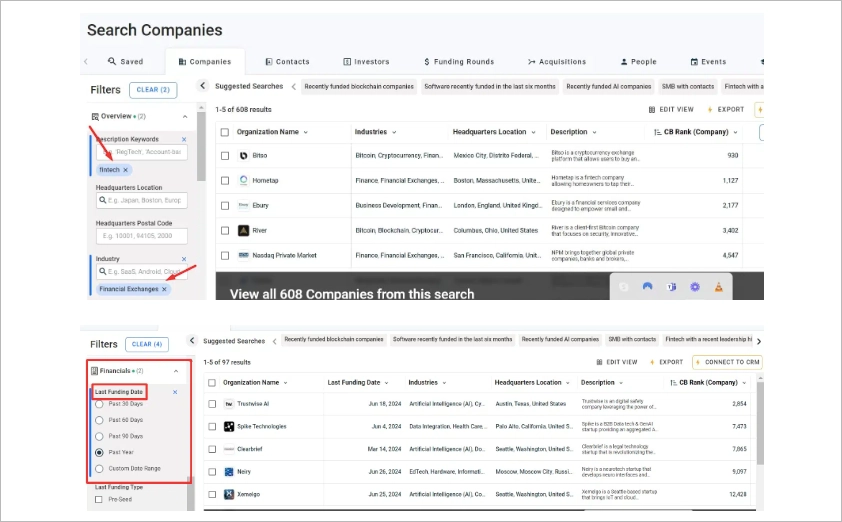A strong lead generation strategy is essential for law firms looking to maintain a steady flow of clients. With approximately 1.32 million active lawyers in 2024 (Statista), competition is fierce, making it more important than ever for firms to stand out. Lead generation in the legal industry refers to attracting and converting potential clients who need legal assistance. It involves strategic marketing efforts, such as search engine optimization (SEO), pay-per-click (PPC) advertising, content marketing, and referral programs, all aimed at driving high-quality inquiries that turn into cases.
This article explores the most effective lead generation strategies for lawyers in 2025, covering digital marketing tactics, client intake optimization, and emerging technologies like AI-driven automation. Whether you’re part of a large firm or a solo practice, understanding these methods can help you reach the right audience and increase conversions. Read on to discover practical steps that can elevate your firm’s client acquisition efforts.

What is Lead Generation Strategy in Law Firm?
A lead generation strategy in a law firm is attracting potential clients who need legal representation and converting them into paying clients. This process involves targeted marketing efforts tailored to specific legal practice areas, ensuring that the firm reaches individuals actively seeking legal services. Effective lead generation ensures a steady flow of inquiries, helping law firms maintain revenue and sustain growth.
Successful strategies often include legal search engine optimization (SEO), pay-per-click (PPC) advertising targeting high-intent legal keywords, authoritative content marketing that answers legal questions, client reviews that establish credibility, and direct engagement strategies such as free consultations. Law firms must adhere to ethical advertising guidelines set by local bar associations while implementing these tactics to remain compliant and maintain professional integrity.

Beyond marketing, a strong lead generation strategy also includes an efficient client intake process, functioning as a well-optimized sales funnel that nurtures potential clients from initial contact to case retention. A dedicated legal customer relationship management (CRM) system allows firms to track client inquiries, schedule consultations, and follow up efficiently.
By implementing a structured follow-up process, firms can nurture warm leads – potential clients who have expressed interest but have not yet committed – to increase conversion rates.
Law firms benefit from having a designated intake specialist or paralegal handle initial inquiries, ensuring that each potential client is properly assessed and directed to the appropriate attorney for consultation.
A strong lead generation strategy paired with an efficient intake process boosts your firm’s success.
How to Create Lead Generation Strategy for Law Firm?
To create a lead generation strategy for a law firm, start by defining the firm’s ideal client profile based on practice areas, case value, and client demographics. A criminal defense firm will target individuals facing charges, while a family law firm will focus on divorce or custody cases. Identifying the legal issues that generate the most revenue and have the highest demand ensures marketing efforts are focused on the right audience.

Once the target audience is defined, optimize the firm’s online presence. A professional, fast-loading website with clear service pages, attorney bios, and direct contact options is essential. Legal SEO should focus on ranking for local and practice-specific keywords, such as “Phoenix personal injury lawyer” or “estate planning attorney in Texas.” PPC campaigns should bid on high-intent legal queries, ensuring ads appear when potential clients actively search for representation. Content marketing must provide clear, actionable legal guidance through blogs, FAQs, and case studies that address common concerns and demonstrate expertise.
Reputation management plays a critical role in building credibility. Law firms should proactively request client reviews on Google Business, Avvo, and other legal directories. Encouraging satisfied clients to leave positive testimonials improves online visibility and trust. A strong referral network with other attorneys, financial advisors, and real estate professionals can also provide a consistent stream of qualified leads.
Optimized landing pages help your firm rank for high-intent legal keywords and attract clients!
To maximize conversions, implement a structured intake process. Law firms should use a legal CRM to track leads, automate follow-ups, and manage client interactions. Live chat and AI-driven chatbots can provide instant responses to inquiries, ensuring no potential client is lost due to delayed responses. Offering free initial consultations, prominently advertised on the website and social media, encourages prospects to engage directly with the firm. Attorneys should use consultations to assess cases effectively, provide clear next steps, and establish a strong rapport with potential clients.
Monitoring performance metrics ensures the strategy remains effective. Tracking website traffic, ad conversion rates, and lead sources provides insights into what works best. A/B testing different ad copy, SEO tactics, and intake processes helps refine efforts for better results.
Attending local legal seminars, joining community groups, and engaging in public speaking opportunities can further enhance the firm’s reputation and attract new clients.
6 Tips in Lead Generation for Law Firms
Generating leads for a law firm starts with targeting high-value cases, ranking for key practice areas, running PPC ads, creating educational content, building credibility through reviews, and converting leads with consultations. By focusing on the right clients, optimizing online presence, and engaging potential leads with informative resources and strategic follow-ups, law firms can attract more qualified prospects and grow their practice.

1. Target High-Value Cases
Targeting high-value cases requires defining an ideal client profile and aligning marketing efforts with their specific legal needs. Law firms should identify their most profitable practice areas, whether it’s personal injury, corporate law, or family law, and focus on cases that generate the highest return.
Understanding where potential clients look for legal assistance is key. Some rely on search engines, while others seek referrals or social media recommendations. By analyzing client behavior and tailoring messaging to address their concerns, law firms can attract individuals who need their specific expertise.
2. Rank for Key Practice Areas
Ranking for key practice areas requires optimizing a law firm’s website for search engines. Using local and practice-specific keywords, such as “Los Angeles criminal defense lawyer” or “estate planning attorney in Chicago,” improves visibility in search results.
Ranking higher in organic search results through effective local SEO ensures that potential clients find the law firm when searching for legal services.
A user-friendly website enhances credibility and encourages visitors to take action. It should clearly outline services, display attorney credentials, and provide an easy way for potential clients to contact the firm. Blog content, FAQs, and case studies can further support SEO efforts by keeping the website informative and relevant.

3. Utilize PPC Advertising for Legal Services
PPC advertising for legal services involves bidding on high-intent keywords to attract clients actively searching for legal representation. Platforms like Google Ads allow law firms to target specific legal issues, such as “divorce lawyer near me” or “DUI attorney consultation.”
To maximize ad spend, firms should use geotargeting to reach prospective clients in their service area. Remarketing campaigns help maintain visibility by displaying ads to users who previously visited the firm’s website but didn’t take action. Well-optimized ad copy with compelling calls to action can improve conversion rates and lead quality.
4. Create Educational Legal Content
Creating educational legal content builds trust and positions a law firm as an industry authority. Blog posts, videos, and downloadable guides that address common legal questions attract potential clients seeking information before hiring an attorney.
Offering downloadable guides, free case evaluations, and webinars as lead magnets can help law firms capture potential clients’ contact information and nurture them into paying clients.
Content should focus on providing clear, actionable insights. Topics like “What to Do After a Car Accident” or “How to Prepare for a Divorce Consultation” resonate with individuals actively researching legal matters. Sharing this content on social media, newsletters, and legal forums expands reach and engagement.
Engaging on social media platforms like LinkedIn, Facebook, and Instagram helps law firms build brand awareness, share educational content, and interact directly with potential clients.

5. Build Credibility Through Reviews
Building credibility through reviews involves encouraging satisfied clients to share their experiences on platforms like Google Business, Yelp, and Avvo. Positive testimonials enhance a firm’s reputation and influence potential clients when choosing a lawyer.
A structured review collection strategy can be highly effective. Law firms can request feedback through follow-up emails, text messages, or in-person conversations. Additionally, incentivizing staff members to collect testimonials ensures that every satisfied client is reminded to leave a review, strengthening the firm’s online reputation.

6. Convert Leads with Consultations
Converting leads with consultations requires offering free or low-cost initial meetings to potential clients. This allows them to discuss their legal issues, assess the attorney’s expertise, and build trust before committing to legal services.
Promoting consultations through website banners, social media posts, and PPC ads increases visibility. During these meetings, attorneys should highlight their experience, provide clear next steps, and demonstrate empathy to improve the likelihood of conversion. A structured follow-up process ensures that interested prospects move forward with hiring the firm.

4 Examples of Lead Generation for Lawyers
Generating leads for law firms isn’t just about driving traffic – it’s about attracting the right clients with the right strategy. Here are four real-world examples of successful lead generation campaigns that helped law firms grow their client base and revenue.
1. Motor Vehicle Accident and Disability Lead Generation
A small law firm specializing in motor vehicle accident claims and disability denial cases needed to attract more high-value leads. Their existing methods weren’t delivering enough qualified cases, and they wanted to increase their caseload by at least two to three cases per month.
The firm launched a focused Google Ads campaign targeting highly relevant keywords for accident and disability claims. Ad copy was optimized for conversions, and bidding strategies were continually refined to maximize efficiency. Regular adjustments were made to keyword selections to ensure the best possible cost per lead.
Within just 45 days, the firm started seeing consistent results. By the third month, they were generating 5 to 6 high-quality leads per month. Their cost-per-lead remained affordable, allowing them to scale their client base predictably.

2. Scaling Up a Personal Injury Law Firm’s Digital Presence
A personal injury law firm with multiple offices struggled to generate high-quality leads. Their reliance on word-of-mouth marketing led to inconsistent client acquisition, and their lack of a strong social media presence limited their reach.
A comprehensive digital marketing approach was implemented. Social media campaigns increased engagement, while targeted advertising focused on high-value practice areas like medical negligence and workers’ compensation. Optimized landing pages and lead capture forms helped convert visitors into consultations. The firm also adopted a performance-based pricing model, allowing them to invest in advertising without upfront risks.
Over four years, the firm generated more than 7,000 high-quality leads. They opened 1,500 new cases in key personal injury areas, increased staff by 20% to handle the growing caseload, and improved their conversion rate by 30% year over year.

3. Driving New Clients for a Regional Law Firm
A regional law firm needed to improve its online visibility to attract more potential clients. Their previous marketing efforts weren’t delivering enough consultations.
A targeted SEO campaign was implemented to boost the firm’s rankings in search engines. The website was optimized with high-value keywords, and content marketing was used to position the firm as an authority in their practice areas.
According to Lawyer Marketerr, the firm experienced a 40% increase in client consultations. Improved search rankings led to a higher volume of organic leads, reducing their dependency on paid advertising.
More visibility, more victories! Landing pages drive consultations and keep your pipeline full.
4. Patent Attorney Lead Generation for Startups
A patent law firm wanted to connect with well-funded startups in tech hubs like San Francisco, New York, and Austin. They needed a strategy that would consistently deliver high-quality leads from businesses likely to require patent services.
A targeted outreach campaign was launched, focusing on startups that had secured over $5 million in funding. Personalized LinkedIn and email campaigns were used to engage founders, co-founders, and CEOs. Instead of a hard sell, the firm shared valuable insights about patent trends and competitor filings to establish credibility.
Over nine months, the campaign generated 217 exclusive leads, averaging over 24 high-quality leads per month. The total reply rate was an impressive 21.8%, showing strong engagement from the target audience.

Why is Lead Generation Important for Lawyers?
Lead generation is important for lawyers because it ensures a steady flow of potential clients, helping firms maintain financial stability and long-term growth. Without a structured strategy, firms risk inconsistent case intake, which can lead to revenue fluctuations and operational challenges.
In a competitive legal industry, relying solely on word-of-mouth referrals is not enough. Law firms that invest in online marketing, reputation management, and client engagement can reach a broader audience and attract clients actively searching for legal services. An effective lead generation strategy allows firms to target specific practice areas, increasing their chances of securing relevant and high-value cases.
Is Lead Generation Legal for Law Firms?
Yes, lead generation is legal for law firms, but it must comply with the ethical standards established by legal regulatory bodies. Law firms must adhere to jurisdiction-specific advertising rules, ensuring that their marketing efforts do not include misleading claims, direct solicitation, or prohibited referral payments.
To remain compliant, law firms should use ethical marketing methods such as search engine optimization (SEO), content marketing, paid advertising, and social media engagement. Transparency in advertising and a clear focus on providing valuable information to potential clients help ensure compliance with professional regulations. Regularly reviewing guidelines from local bar associations is essential to avoid ethical violations.
Your next big client is one click away! Create landing pages that turn visitors into high-value legal clients.
How Do Lawyers Generate Leads?
Lawyers generate leads through a combination of online marketing, professional networking, and client referrals. A well-optimized website with strong SEO, informative content, and clear calls to action helps attract potential clients actively searching for legal representation. Law landing pages play a crucial role in converting website visitors into inquiries, providing a focused and persuasive experience that encourages potential clients to take action.
Other effective methods include pay-per-click (PPC) advertising, social media engagement, email marketing, and partnerships with other businesses that can provide referrals. Some law firms choose to partner with specialized lead generation services to ensure a consistent flow of high-quality inquiries, allowing attorneys to focus on client representation.
Attending industry events, speaking at seminars, and maintaining strong relationships with past clients can also lead to valuable word-of-mouth referrals. Consistently engaging with potential clients through multiple channels increases lead flow and case opportunities, ultimately helping law firms secure more leads.

What’s the Use of Landing Pages in Lead Generation for Law Firms?
Landing pages in lead generation for law firms serve as dedicated pages designed to capture potential client inquiries. These pages focus on a specific legal service, offering valuable information and a clear call to action, such as booking a consultation or filling out a contact form.
A well-optimized landing page improves conversion rates by eliminating distractions and guiding visitors toward taking action. Using A/B testing, law firms can refine their landing pages for maximum effectiveness.
A high-quality landing page builder like Landingi makes it easier for law firms to create, manage, automate, and optimize these pages without needing advanced technical skills. Landingi offers intuitive drag-and-drop editing, allowing legal professionals to design professional-looking pages quickly. This is particularly useful for law firms that need to create multiple pages for different practice areas, such as personal injury, family law, or corporate law.

Another crucial feature of Landingi is its ability to run A/B tests effortlessly. Law firms can experiment with different headlines, images, or form placements to determine what resonates most with potential clients. Since legal services often rely on trust and credibility, even small adjustments in messaging can impact conversion rates.
Integrations also play a significant role. Landingi connects with CRM systems, email marketing tools, and automation platforms, ensuring that every lead is properly tracked and nurtured. This is essential for law firms managing a high volume of inquiries, as it prevents potential clients from slipping through the cracks.
Security is another major concern for law firms, as they handle sensitive client data. Landingi provides secure hosting and compliance features, ensuring that all information collected through landing pages is protected.
Create effective landing pages that attract and convert the right clients efficiently!
What’s the Use of AI in Lead Generation for Law Firms?
AI helps law firms attract potential clients more efficiently by automating time-consuming tasks, improving targeting, and optimizing marketing efforts. One of the most significant advantages is automating client intake. AI-powered chatbots can handle initial inquiries, answer frequently asked questions, and even assess whether a potential client meets the firm’s criteria. Another useful type of AI tool is website and landing page generators. AI-powered landing page builders assist in creating and updating content, generating SEO-friendly material, and even producing entire pages. This functionality allows attorneys to focus less on unqualified leads and dedicate more time to cases that truly matter.
Another way AI enhances lead generation processes is by analyzing search behavior and recommending keywords that help law firms rank higher in search results. AI-driven tools assess which terms prospective clients use when looking for legal services and suggest adjustments to improve ad performance and search engine rankings. This leads to better visibility and higher-quality leads.
AI also plays a crucial role in personalizing outreach efforts. Automated email campaigns and follow-up messages can be tailored to address a lead’s specific legal needs, making communication feel more relevant and increasing the chances of conversion.
What are the Benefits of Lead Generation for Law Firms?
The benefits of lead generation for law firms include a consistent pipeline of new clients, increased brand awareness, and greater control over revenue growth. A well-planned strategy reduces dependence on referrals and ensures a steady stream of potential clients seeking legal assistance.
Effective lead generation enables firms to attract cases that align with their expertise, improving efficiency and profitability. It also enhances credibility by establishing a strong online presence and positioning the firm as a trusted authority in its field. Additionally, consistent marketing efforts build long-term client relationships, increasing the likelihood of repeat business and referrals.
What are the Limitations of Lead Generation for Law Firms?
The limitations of lead generation for law firms include intense competition, high marketing costs, and strict ethical regulations. Many legal markets are saturated, making it challenging to differentiate a firm without significant investment in advertising and client outreach.
Additionally, ethical restrictions limit certain promotional methods, requiring firms to carefully structure their marketing efforts to ensure compliance. Lead quality can also be inconsistent, with some prospects not being ready to hire or lacking the budget for legal services. To maximize effectiveness, law firms must continuously refine their strategies, focusing on targeting the right audience and optimizing marketing efforts to attract serious clients.
Start Generating More Legal Leads Today
A well-executed lead generation strategy is essential for law firms looking to attract high-value clients and maintain a steady caseload. By leveraging targeted digital marketing, optimizing intake processes, and utilizing automation tools like AI and CRMs, law firms can enhance their client acquisition efforts.
One of the most effective ways to convert visitors into potential clients is through high-performing landing pages. A dedicated landing page simplifies the client journey, ensuring a seamless experience that encourages action – whether it’s scheduling a consultation or requesting more information. With Landingi, you can create, optimize, and manage professional landing pages without coding, helping your firm maximize conversions.
Take control of your lead generation strategy and start building landing pages that work for you. Try Landingi for free today!






